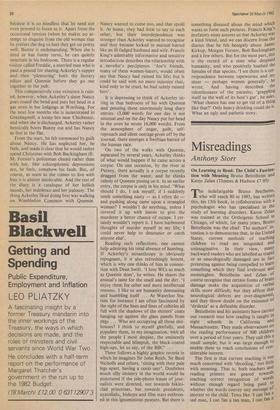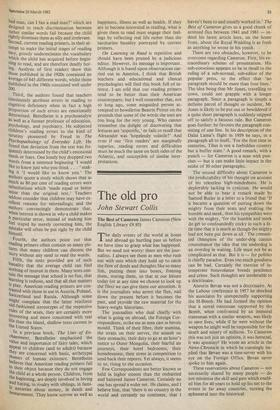Misreadings
Anthony. Storr
On Learning to Read: The Child's Fascina- tion with Meaning Bruno Bettelheim and Karen Zelan (Thames & Hudson £7.95) The indefatigable Bruno Bettlheim, who will reach 80 in 1983, has written this, his 13th book, in collaboration with a psychologist who has specialised in the study of learning disorders. Karen Zelan was trained at the Orthogenic School In Chicago, of which, for many years, Bruno Bettelheim was the chief. The authors' In- tention is to demonstrate that, in the United States, current methods of teaching children to read are misguided and unimaginative. In their view, manY backward readers who are labelled as, stupid or as neurologically damaged are in fact protesting against being compelled to learn, something which they find irrelevant and meaningless. Bettelheim and Zelan of course recognise that certain forms of brain damage make the acquisition of verbal skills more difficult; but they affirm that neurological defects are over-diagnosed, and they throw doubt on the existence of `dyslexia' as a definable disorder. Bettelheim and his assistants have carried out research into how reading is taught In eight schools in California and Massachusetts. They made observations on the reading performance of 300 children over a period of four years. They call this a small sample; but it was large enough to enable them to reach conclusions of con- siderable interest.
The first is that current teaching is too much concerned with 'decoding,' too little with meaning. That is, both teachers and reading primers are geared towards teaching correct recognition of words without enough regard being paid to whether the words convey any message of interest to the child. Texts like 'I can fan a sad man, I can fan a tan man, I can fan a bad man, can I fan a mad man?' which are designed to teach discrimination between
rather similar words fail because the child rightly dismisses them as silly and irrelevant.
Second, current reading primers, in their at- tempt to make the initial stages of reading easy, grossly underestimate the vocabulary which the child has acquired before begin- ning to read, and are therefore deadly bor- ing. Analysis of first readers show that those published in the 1920s contained an average of 645 different words, whilst those
Published in the 1960s contained well under 200.
Third, the authors found that teachers consistently attribute errors in reading to cognitive deficiency when in fact a high Proportion of such errors are emotionally determined. Bettelheim is a psychoanalyst as well as a former professor of education, Psychology, and psychiatry. He subjected Children's reading errors to the kind of scrutiny pioneered by Freud in The Psychopathology of Everyday Life. He found that deviation from the text was fre- quently determined by the child's emotional needs or fears. One lonely boy dropped two words from a sentence beginning 'I would !Ike to know just who you think . . . ' mak- ing it would like to know you.' The authors quote a study which shows that as Much as 80 per cent of reading errors were substitutions which 'made equal or better sense than the original text.' Teachers seldom consider that children may have ex- cellent reasons for misreadings; and the authors convincingly demonstrate that, when interest is shown in why a child makes a Particular error, instead of making him feel stupid by merely correcting him, the
Mistake will often be put right by the child himself.
Fourth, the authors point out that reading primers often contain so many pic- tures that many children can discern the story without any need to read the words. Fifth, the texts provided are of such banality that the average child can find nothing of interest in them. Many texts con- tain the message that school is no fun, that learning is tedious, and that all that matters is play. American reading primers are con- trasted with those in use in Austria, Poland, Switzerland and Russia. Although some might complain that the latter reinforce old-fashioned stereotypes of the respective roles of the sexes, they are certainly more interesting and more concerned with real life than the bland, shallow texts current in the United States.
In a previous book, The Uses of En- chantment, Bettelheim emphasised the value and importance of fairy tales, which appeal to children (and to adults) because tile), are concerned with basic, archetypal themes of human existence. Bettelheim
in that American reading primers fail In their object because they do not engage
the child as a whole person. Children, from the beginning, are deeply involved in loving and hating, in rivalry with siblings, in fami- ly anxieties about money, in death and bereavement. They know sorrow as well as
happiness, illness as well as health. If they are to become interested in reading, what is given them to read must engage their feel- ings by reflecting real life rather than the saccharine banality portrayed by current primers.
On Learning to Read is repetitive and should have been pruned by a judicious editor. However, its message is important. Although it is based upon observations car- ried out in America, I think that British teachers and educational and clinical psychologists will find this book full of in- terest. I am told that our reading primers tend to be better than their American counterparts; but I well remember that, not so long ago, some misguided person at- tempted to bowdlerise Beatrix Potter on the grounds that some of the words she uses are too long for the very young. Who cannot remember the delight of discovering that lettuces are 'soporific,' or fails to recall that Alexander was 'hopelessly volatile?' And even if our 'first readers' are marginally superior, reading errors and difficulties must be much the same on both sides of the Atlantic, and susceptible of similar inter- pretations.



































 Previous page
Previous page